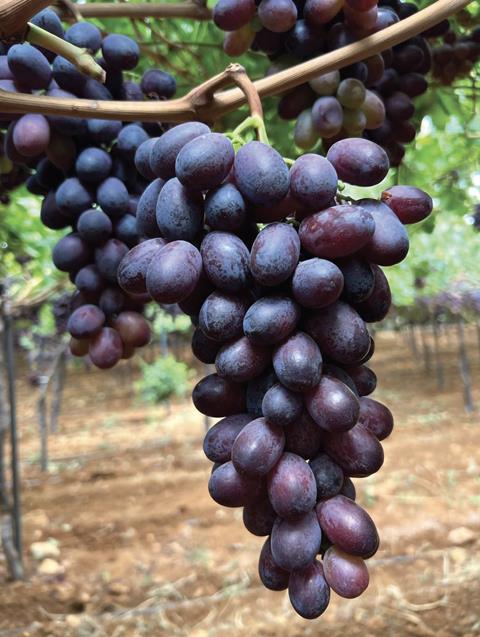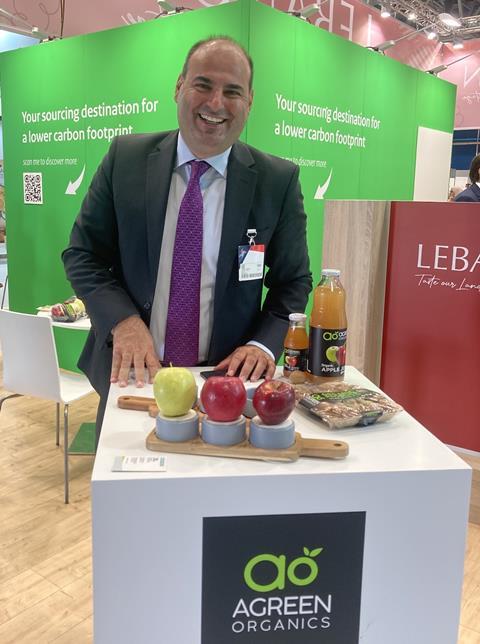Lebanese exporters are showing real ambition in Europe, aiming to respond to the particular needs of the market in spite of the severe economic and political trials at home
Despite the significant challenges currently facing all Lebanese businesses, fresh produce exporters in the country continue to hunt for new openings for their products, especially on the European market.
The ongoing financial crisis afflicting the country has not been helped by the absence of a viable government to respond to it, with the presidency remaining vacant for more than a year, while the war and humanitarian crisis in Gaza have threatened to destabilise the entire region. Yet amid the turbulence, opportunities in fruit and vegetables undoubtedly remain.
Lebanese company Agrotica was founded in 2018 with the aim of taking advantage of the excellent growing conditions in the Beqaa Valley for the sustainable production of table grapes and stonefruit. The company was among a dozen Lebanese exporters exhibiting at this year’s Fruit Attraction exhibition in Madrid on a shared national pavilion supported by the CBI.

“I am part of this programme,” says Hania Chahal, a business export coach for the CBI. “It is funded by the CBI, which is the centre for promoting imports from developing countries. We support 21 companies in accessing new markets in fresh fruits and vegetables. We organise the Lebanese pavilion and we try to prepare the companies for exports, coach them and connect them to traders directly.”
Agrotica is one of these companies. “They are focused on grapes,” says Chahal. “But it took them to visit Fruit Logistica in Berlin for the first time to understand what the European market really wants. After that they started to focus on growing late varieties of grapes.”
Opportunities in Europe
Lebanon produces a wide variety of fresh produce, but grapes and avocados stand out as the principal strategic crops, according to Chahal.
“There are good opportunities in Europe for grapes and avocados due to the windows of supply,” she says. “The Gulf is historically an important market due to its proximity, but Africa is also growing, in particular West Africa.”
Finding new markets has been a priority for Lebanese exporters ever since the loss of the important market of Saudi Arabia, which has banned Lebanese imports of fruit and vegetables since October 2021. Combined with the unprecedented financial crisis, which has afflicted the country since 2019, and the severe impact of Covid-19, companies are now ready for just about anything.
“When you’re dealing with agricultural products, you don’t have a choice, you just need to continue,” says Chahal. “There’s been a kind of shift in people’s mentality that we can no longer take anything for granted. For example, when we lost the Saudi market, we realised you can lose anything in a moment. So you always have to plan accordingly and look at what other markets you can benefit from.”
However, Chahal says it takes a particular mindset within a company to commit to investing in certifications for the European market when they are rarely requested in the Gulf.
“Sometimes the social certifications are also difficult to attain for Lebanese companies because they don’t really take the context of a country like Lebanon into account,” she says. “So what we try to help them do is become responsible businesses, in the way they treat their employees, in the way they treat the environment and in the way they give back to their community. This will make it easier to gain the right certifications in the future.”
Organic promise
Rudolph Elias, managing partner at organic producer Agreen, says he has been impressed by the growth in organic sales seen across the Middle East region, as well as the opening of multiple retail outlets dedicated to organic products.

“We grow organic produce, but we are also in the process of converting some products to organic, so we sell these as conventional,” says Elias. “We do fruits and vegetables and we make a lot of efforts in post-production to give additional value because the costs of production in Lebanon are quite high. For our nuts, for example, we do dry-roasting, which also adds more flavour.”
Agreen grows multiple apple varieties in Lebanon. “Some varieties are more available than others in terms of volumes,” says Elias. “We have Golden, Gala, but only small volumes of Pink Lady. The Lebanese Pink Lady has a better crunch and a better sweetness than many other varieties thanks to the specific weather conditions in Lebanon.”
According to Elias, Lebanon boasts around 16 different microclimates. “This allows you to get really tasty fruits,” he says. “This has been a very good year for Lebanese apples. We have the same production volume as previous seasons, but other producing countries have been affected by weather conditions. This has allowed our prices to finally be competitive on the marketplace. So now we’re able to export to Europe and other places.”
Another challenge, of course, is the falling purchasing power of consumers across Europe, causing many to opt for price over quality.
“This is a big challenge for high quality products,” say Elias. “We went into organics to maximise the positive impact of what we do, not just for the farmers, but also for consumers and for the environment. Hopefully things will get better soon.”



